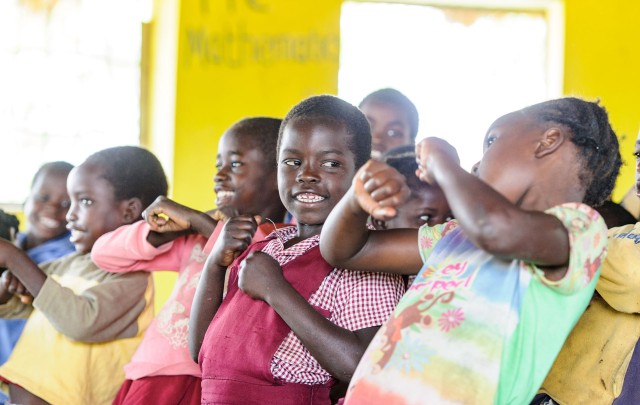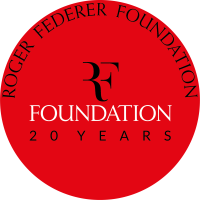School Readiness Strategy
A new strategy is a milestone in the development of an organisation, a pause to reflect on what has been learned, throw off any ballast, and take advantage of new opportunities. The Board and the management of the foundation spent a lot of time on the strategy process and developed the School Readiness Strategy for the coming years in several stages. The focus was determining the niche in which the Foundation could most effectively use its skills and budget within the defined period.
What have we learned from the past strategy?
With the last strategy, the Roger Federer Foundation was already consistently committed to focused grant making. Geographically, in additional to Switzerland and South Africa, the Board opted to expand the geographical focus to neighbouring countries in Southern Africa, ultimately making us active in six countries. When selecting the countries, the homogeneity of the education systems and the use of English were key to us so that we could develop as many learning synergies as possible across the projects. Concentrating on one region also increased our management efficiency, especially since we opened a regional office in Johannesburg with three local employees in 2016.
Thematically, the Foundation focused exclusively on the quality of children's education. This has been achieved with a wide range of effective projects to be implemented by carefully selected local partners. External evaluations have sufficiently documented the long-term impact of our support. Right from the start, we invested roughly half in early childhood education and half in primary schooling. This consistent focus can be rated as very positive. As a result, the team developed into actual education experts and accompanied and tested various approaches from our partners. In the region, we were able to sharpen our organisation's reputation and establish a network with other stakeholders working on the same field. We also have excellent local partners, without their tireless efforts and great expertise the good results of the past few years would not have been possible.
In addition to the thematic focus, our funding method shaped our work. In all of our activities, we focused on strengthening existing local projects and partners. Expanding limited capacities and knowledge was of central importance. It is not us who brought about the changes we have seen, but the energy of the local people who became mobilised to seek solutions for their educational issues with our complementary support. This self-help approach has been shown to lead to sustainability not only in the education system, but also in the entire village structure.
Nevertheless, there is room for strategic improvement. The target group was quite broadly defined in the last strategy, which led to completely different educational projects, with different components and different results. A 12-year-old girl has other educational needs than a three-year-old child. At the end of the strategy, we were able to measurably improve the educational quality of over one million children, but there were no cross-project indicators that reflected our impact as a Foundation. Our projects also achieved decisive changes at the community and village levels, but, with the exception of Malawi, our engagement has had hardly any systemic effect at the national or even regional level. This would have required a different approach right from the start. The past few years have also helped us realise that while there are many governmental and non-governmental stakeholders working in either early childhood education or primary education, most are not concerned with the transition between the two sectors. But it is precisely at this transition point in children's lives that a lot can go wrong with negative consequences that can shape the rest of their lives. Last but not least, the adoption of the United Nations' 17 Sustainable Development Goals has led to a dynamic global agenda. We are all called upon to make our contribution to achieving these goals. It was therefore very important to us to align our work accordingly.
What is our new strategy?
The Roger Federer Foundation remains committed to its goal of empowering children living in poverty. The most effective and sustainable theory of change to achieve this goal is to provide a high quality education system. Education is not only a human right, but also a crucial factor in breaking the cycle of poverty, improving health, and strengthening social responsibility and environmental protection. Despite its importance, education is in crisis around the world. In many cases, the quality is insufficient, minimum performance goals are not being achieved, and children drop out of school early. For many children, school ends after just a few years in primary and middle school. Research shows that a key reason for this is the lack of access to high-quality early childhood (preschool) education in developing countries. That is why we will focus on the youngest learners in the next seven years, especially because this is an area that is globally clearly underfunded.
The most vulnerable children in particular, who would be dependent on education to escape the poverty trap, often do not have a good start in primary school. The transition from home or preschool to primary is a highly sensitive time and full of challenges. If children are insufficiently prepared for school or are not well embedded in the new and rarely age-appropriate environment, there is a high probability that they will fail, which means that they will not develop properly or even leave school early. In accordance with Sustainability Goal 4.2, we are fully focused not only on improving children's readiness to go to school, but also on making schools more ready for children.
Our goal is to give more than one and a half million children a good start to their education. Children should have access to at least one year of organised learning before starting school. We are committed to ensuring that the children develop in an age-appropriate manner and survive the first years of school without having to repeat years or leave school early. In order to achieve a system that can ensure this, we are working to make all relevant participants such as parents, teachers, communities, and government officials aware of the needs of children and accept responsibility for them. Thanks to their commitment, their children are being given access to preschool, where they encounter an age-appropriate learning environment. Processes are established so that the transition of the children to primary school goes smoothly and they can quickly feel comfortable. Thanks to decentralized, digital-based continuing education, the teaching staff are working on improving their skills comprehensively in learning groups. An Early Learning Kiosk in the form of an offline tablet, developed individually for each country and by local experts, contains a wide range of learning content for early education, work with parents, building a natural playground, the development of teaching materials, stories to read aloud, and an app for the continuous observation and analysis of each child's development. The learning group approach promotes a peer-to-peer mentoring over the long term.
In each of the six countries in southern Africa we hope to implement the entire package of the School Readiness Initiative in between 1,500 and 3,000 institutions. This means that we will reach around 12,000 educational institutions in the next seven years. This is being done in close formal consultation and cooperation with the local authorities. In the long term, we hope that the respective Ministries of Education will distribute the Early Learning Kiosk to every relevant institution in their countries.
What are the operational consequences?
The new strategy has taken an innovative and systemic approach from the ground up. This requires some changes in the operational set-up of the Roger Federer Foundation. The Foundation is intensifying and formalising its cooperation with government agencies at all levels. It will itself be active and coordinate the country programmes and the development of the Early Learning Kiosk. The programme is implemented by a consortium of local partners, where the organisations will be of different sizes and working on different focus areas. With one exception, we were able to convince all of our previous partner organisations to commit to the School Readiness Initiative. Further partners and also selected service providers will also be able to join in order to help expand the programmes nationwide in at least some of the countries.
Overall responsibility for the country programme remains with the Roger Federer Foundation. We are therefore increasing our reporting, documentation, and evaluation capacities and expanding our team accordingly. Close coordination of the School Readiness Initiative with other national and international actors is essential. Roger Federer will work even more intensively as an ambassador and President of the Foundation to ensure the successful implementation of the strategy, which has a budget of approximately 50 million Swiss francs.


